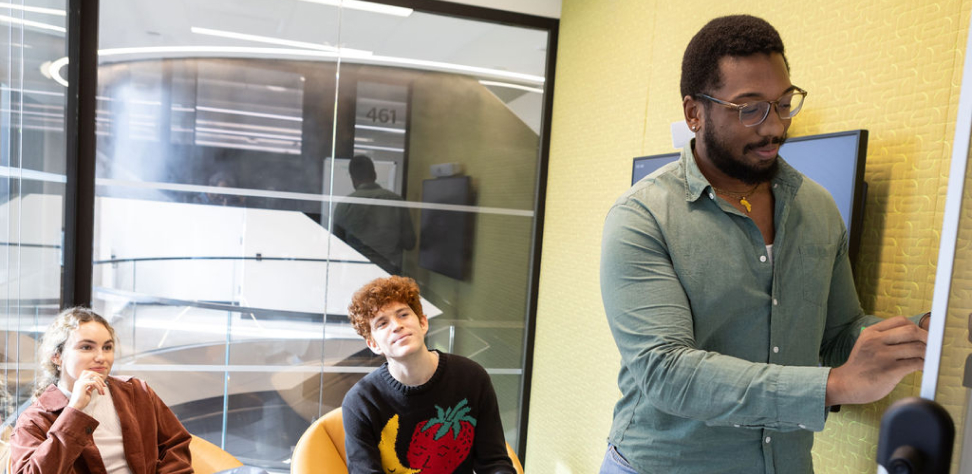The rotations are aimed at accomplishing a few things:
The first is helping new SP hires gain context about our business and understand how all the pieces fit together. The second is to take part in a centralized learning and development curriculum, and the third is to develop connectivity across various areas of the firm. This inter-group familiarity is extremely valuable as individuals navigate existing and emerging project streams.
Over the course of the year, we’ll get a better understanding of each person’s skills and work styles, allowing them to join a group that best unlocks their potential in the years to come.
SPs are expected to remain flexible and focus on improving existing business lines or helping shape new ones at varying levels of complexity and scope. This work generally will involve a combination of “Strategy” and “Product” contributions. We’ve loosely defined strategy-related work as involving deeply tactical team coverage and process analysis, while product-related work encompasses prioritization, project scoping, and in-depth coordination of stakeholders.
The Strategy and Product interview process
The Strategy and Product interview process includes an online assessment, a video interview, and a final round of in-person or virtual interviews.
The online assessment consists of multiple-choice and short-answer questions and typically takes an hour to complete.
The video interview consists of broad problem-solving exercises with a mix of technical and qualitative components. During this round, a full-time SP will pose a few scenarios to you that you’ll work through together in real time. Clearly communicating thoughts and questions to your interviewer is crucial in ensuring you are on the same page and working toward a productive solution. If the interview goes well, we’ll invite you to come on-site to your local office.
At this stage, we’ll dive into longer-form problems and questions that are more representative of the work we do. We don’t expect you to immediately understand all parts of the questions you’re asked. You’ll be encouraged to ask clarifying questions along the way so you have all the information needed to answer the question and so we understand how you’re approaching the problem.

What we look for in a candidate
Successful candidates are curious, organized, and open-minded. They approach interview questions thoughtfully and collaboratively. Most are comfortable working with numbers and logic. Perhaps most importantly, the candidates we ultimately hire are humble, pleasant to work with, and open to feedback.
As you prepare for your interview at Jane Street, here are a few tips:
Communicate clearly. As you begin to answer a question, clarify your thought processes along the way: are you thinking out loud, stating a fact, or making a suggestion? It’s important to verbalize how you think so we can best evaluate you.
Approach the problem methodically. We’re interested in your ability to structure your thought process. How are you deciding what’s important to think about? What might you be leaving out? It’s often helpful if you periodically summarize which issues you’ve addressed so far within a problem and what remains to be discussed. We also recommend using concrete examples, if possible, to demonstrate how everything fits together from your perspective.
Don’t rush. We don’t want you to feel pressured to get an answer out as fast as you can. It’s ok to pause, think about the problem, and communicate how you want to proceed. We’re looking to see how your mind works, not how fast you can reach a solution.
Learn from your mistakes. You aren’t expected to get things exactly right when first presented with an interview question. It’s more important that you’re able to realize mistakes, correct inaccurate assumptions, and find better solutions along the way.
When in doubt, ask. As you work through a question, you might be wondering what your interviewer is trying to optimize for. Accuracy? Efficiency? Speed? When in doubt, ask. We’ll certainly ask things of you throughout our conversations — we can learn a lot from hearing your thoughts on how a process should work, where information should flow, or why a rule exists.
Know what you don’t know. State your assumptions and what effects those have on the solutions you’re proposing. We appreciate it when candidates say, “I’m not sure, but my understanding is…” It’s ok that you don’t have the complete answer — being humble about what you don’t know is something we appreciate. And as much as you can, avoid technical jargon, especially when you don’t fully understand what it means.

What we’re not worried about:
Prior knowledge of finance. We’re looking for smart, curious people who enjoy solving interesting problems, regardless of background. We highly encourage you to ask questions about any terminology or concepts you don’t understand and we’re more than happy to work through things that might be unfamiliar to you.
Speedy mental math. We look for candidates who are comfortable with quantitative work, but we don’t spend a lot of time multiplying or adding large numbers in our heads. A correct answer is better than a fast one!

“I really appreciate the amount of space you have to solve problems your own way at Jane Street. There are always resources available to guide you if you get stuck, but for the most part, as long as you’re doing reasonable things, it’s up to you to decide how to approach a project.”
-Aditya

“An idea that especially resonated with me is not being afraid to admit mistakes. Here at Jane Street, mistakes are not seen as a failure or a testament against your capability but as an opportunity to learn and improve. The sooner a mistake is found and shared, the better.”
-Abigail

“Probably one of the coolest things I’ve learned being an SP is how to code in OCaml, which is awesome. I’m in this sweet spot of understanding the business side of Jane Street while also having some of the tools needed to implement a lot of the ideas we come up with.”
-Davenport
